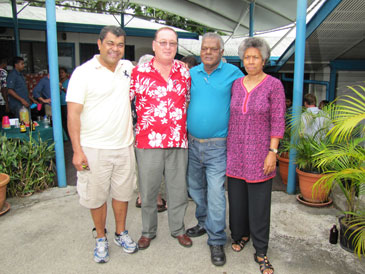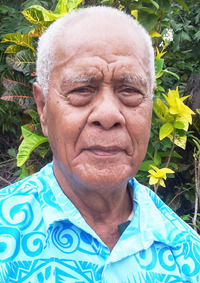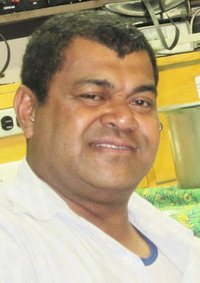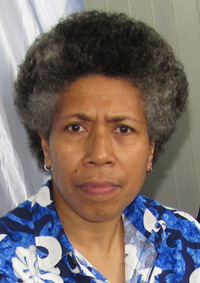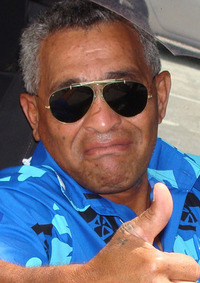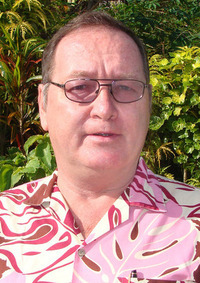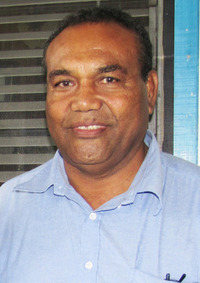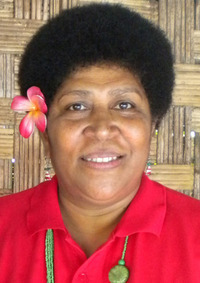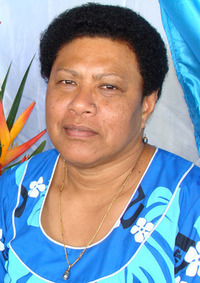On Friday, November 1st, 2013, Secretariat of the Pacific Community's Geoscience Division (GSD), would be celebrating 11 current and former staff members who have dedicated 20 years or more to the organisation. In the days leading up to the ceremony, GSD will publish interviews of the 11 individuals, which gives an unprecedented insight into the history, advancements in service delivery and progression of technology not only within GSD, but also throughout the Pacific region.
Staff Profiles
| Sekove Motuiwaca | 1980-present |
| Russell Howorth |
1979-2013 |
| Mereseini Lala Bukarau |
1985-present |
| Unaisi Bainiloga | 1987-present |
| Salestino Niu Daurewa |
1987-present |
| Laisa Baoa |
1987-present |
| Enele Gaunavou |
1988-present |
| Setareki Ratu |
1986-2011 |
| Robert Smith |
1989-present |
| Peni Musunamasi | 1989-present |
| Litia Waradi | 1989-present |
1987-present
What position(s) have you held at GSD?
I have been working at GSD as an office assistant since joining in 1987.
What is the biggest change you’ve noticed over the years?
There were fewer buildings and more compounds when I began work at GSD. There was only the main reception building and the current DRP front building. Now we have more buildings, a smaller compound and less parking. Also, I notice that people are not as disciplined about punctuality as they used to be. For 26 years, I have begun promptly at 6 am opening all GSD offices, lights and turning on air con.
What do you like about working at GSD?
I have loved my job at GSD since the first day I started. I always commit to every major and minor office duty required of me. I am very proud that former and current Directors almost always ask me to pray for meals whenever there is a staff function.
What is your favourite GSD memory?
My favourite memory is when I attended the GSD Commission annual meeting in Nadi in 2010 and I was asked to open the session with a prayer.
What other memories stand out in your mind?
One of my most terrifying moments at GSD was during the 1987 coup. Soldiers entered GSD in numbers, climbed over roofs and prepped their guns surveying the military barracks. No one was injured or directly threatened but the presence of soldiers with guns was enough to traumatise some staff.
Another was the shooting at the military barracks in the 2006 coup. This greatly terrified the GSD staff. Evacuation began immediately as the shooting started. Gauna (GSD Driver) spent the day transporting staffs away from danger to their respective homes. I am grateful to have survived the coups.
1989-present
What position(s) have you held at GSD?
I began working for GSD in 1989. I’ve travelled up the ranks at GSD. I started as an assistant electronic technician, all the way up to senior electronic technician. I then became acting electronic engineer, electronic engineer, and now I’m Team Leader for the Technical Workshop. We used to be two officers, but I now have five staff under me.
How has your work changed over the years?
The changes in technology have really transformed our work. We used to use a trisponder system to pinpoint our position out at sea. There was no GPS back then. You’d have to go up to the mountains, carrying heavy batteries and solar panels. Then when you were at sea, all of a sudden, your station might cut off. You would have to stop the survey, get off the boat and climb the mountain to see what had gone wrong. Now, we have a Marinestar navigation system we can take with us on the boat that corrects itself. Shipping and accessibility around the region has really changed as well. I went to PNG on a survey in 1990 with the trisponder system in nine big boxes. Now I can take a whole GPS system with me in my carryon.
What do you like about working at GSD?
I’ve worked under many different directors and different environments, but I am happy where I am today. I’ve learned a lot and have received a lot of training to learn technologies and keep up with the updates. It’s been good because only through experience can we continue to upgrade our expertise and the services we provide to member countries.
What is your favourite GSD memory?
The best memories are the struggles I have gone through to be where I am today.
What advice would you give to new GSD staff?
My advice to new staff members is ‘patience is a virtue.’ Good things don’t come easily as you need to earn these by having patience and being a responsible Team Player.
1985-present
What position(s) have you held at GSD?
I was previously the librarian at Mineral Resources Department then started with GSD in 1985. I took over from the head of Publications and Library with the title “Documentalist” under the UN mineral prospecting project (that was the start of GSD) and to this day, I still am teased about that title. In 1987, the job was split, separating the Publications component from the Library component. Without hesitation, I chose Publications. In 1992, after a Technical Editor was recruited, I became an Assistant Editor. In 1996 I was coerced to take on the Publications Coordinator/Editor, taking care of Publications, including graphics as there was no graphic artist then.
What do you like about working at GSD?
I have nothing to compare it to, really. When I was younger, the opportunity to travel was a privilege, to see the Pacific, and learn Fiji's 'place' in it. After visiting places like Tarawa in the 90s, I made sure to eat all my vegetables and fruit with a new appreciation for all the blessings we have here. Mind you it is the Republic of Kiribati that impresses me the most, out of all the member nations, in their use of regional mechanisms to address their national interests. No other country comes close.
What is your favourite GSD memory?
Not so much my favourite but definitely an outstanding memory was when the Technical Editor left and I was told to do the job, "sink or swim," by Philipp Muller, with no raise in pay, mind you! I remember rehearsing for days and eventually working up the courage to make an appointment to ask for a fair wage! I eventually got it, but this was the defining incident of transition from worker bee to professional staff, where I understood I was on a career path and that no one else was going to speak up for me.
What do you see as GSD’s greatest asset?
The data. All employees here have to understand how valuable the bank of information we keep here is to the Pacific island nations. When we all leave here, the data will still exist.
What would be your advice to any new staff at GSD?
Listen more and talk less. Remember the island nations in whose name and for whom SPC does work and that there will be times that they will need shepherding and that organisations like ours exist because of the so-called lack of capacity in these nations. Sometimes we can complain and wish that they had their act together more; however, if this were the case then our services would NOT be required by them.
Sekove Motuiwaca 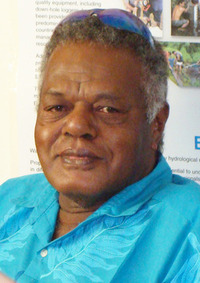
1980-present
What position(s) have you held at GSD?
I have been a Geological technician since I joined and progressed to senior geological technician when merged with GSD merged with SPC.
How has your work changed over the years?
In the beginning I had more field work, nowadays I am more based in and around the office and the workshop.
What is the biggest change you’ve noticed over the years?
The biggest change I have seen would be development and better transportation in the region.
What do you like about working at GSD?
The favourite thing about GSD is the travelling and learning experience it has brought me because it has opened my eyes up to many cultures of the various member countries.
What is your favourite GSD memory?
This was in Pukapuka (Northern Cook Islands). While in the field it was reported to that a pontoon had sunk and there was no trace of it. We had to dive for it, retrieve and revive it. This was a very challenging and rewarding experience especially that we got it running again and to this day they are now using it in Yap.
Also, there was a diving expedition just outside of the Suva harbour, at about 60 ft. When I was faced with 3 sharks I had no weapon to protect myself. The instructor was in front me while I was with my buddy behind, when my buddy had problems. He had to go back up with the instructor, I was told to stay behind when I saw the sharks alone. “Koli ni ga kaidia, tamani rere curumi au! Sega ga ni katia baleta niu mai tailevu” Translation: “They looked like vicious dogs that bite, and I have never been so scared in my life. But they never bit never because I am from Tailevu!”
1986-2011
How has your work changed over the years?
I started as a marine engineer at the workshop now known as the electronic lab, and moved to work as a technical assistant for GSD after funding ended in my previous work. It went from overlooking the survey equipment in the old workshop, I moved to work as a technical assistant at GSD looking after the overall GSD housing systems such as lights, piping system, water system, fire, evacuation, security systems, etc.
What is the biggest change you’ve noticed over the years?
All the survey data we collected over all the years is now a valuable asset for our member countries.
From all the years I have worked at GSD, I have seen the organisation grow bigger and better in delivering integral services to its member countries.
What do you like about working at GSD?
I believe GSD deals with root issues in the Pacific and provide critical assistance to member countries.
I also I greatly appreciate the fact that GSD looks after its staff. I am very grateful for the employee benefits, the medical cover, and for the consideration and support given to its staff when in need.
What is your favourite GSD memory?
I don't have any particular memory in working at GSD but I do enjoy one thing in my years of work at GSD. GSD has allowed me to put into good use the combination of my expertise and work experience in my everyday work. I thoroughly enjoyed my work at GSD and when we enjoy what we do, we naturally do it to the best of our ability. GSD has enabled me to do all these in my years of tenure in it.
Any advice to the younger staff?
Do not think only about yourselves and your needs. Think about your contribution and the capability you each have to push GSD further to be better than its current best.
Having said that, I do wish all each staff and former GSD Directors the very best in your endeavours, but I especially would like to wish the very best to GSD as a whole. I pray GSD continues to grow, excel and positively affect its member countries.
1979-2013
When did you begin work at GSD?
I first visited GSD while on secondment at the University of the South Pacific in 1979. At the time it was a UNDP Regional Project with only 10 staff.
What position(s) have you held at GSD?
1979 – 1986: Technical Advisor
1986 – 1997: Training Coordinator (also OIC of UNDP/ESCAP Project from 1991 – 1992)
1997 – 1998: Technical Advisor
1998 – 2002: Programme Manager
2002 – 2005: Deputy Director
2010 – February 2013: Director of GSD Commission and GSD Division of SPC
What is the biggest change you’ve noticed over the years?
The region is much bigger. The Equator no longer exists except in name only...it no longer separates North Pacific countries from South Pacific countries. Amongst the island countries they are all Pacific island developing countries. These countries want to work together and learn for each other to find the solutions to their development challenges. They also want to work with donor partners as equals .
The advent of the Law of the Sea. With this has come slowly for many the realisation of the responsibilities of sovereignty associated with 200 nautical mile EEZs and and for some possible seabed extendion beyond. This matter has of course been obscured by the interest in tuna. But note as we speak the island countries are realising that their future economic potential lies with the large ocean (for many over 99% of their soverereign territory) they have stweadship over.
Generally small if not tiny island areas and associated traditional land ownership. Serious pressures on land resulting from population shifts, large multinational extractvie industries, urbanisation and infrastrucuture.
The remarkable contribution of ICT in the past 5-10 years. For example has resulted in better communications overcoming the tyranny of distance, GPS highly accurate positioning systems, and GIS technologies able to produce images and database at a scale islanders can use them (1:5000) both on land and at sea,
Regionalism (the style of the past) is over and a new way forward is urgently needed.
What do you like about working at GSD?
Whilst the road has often been bumpy coping with issues such as long term security of funding, GSD has always been progressive and proactive over the course of its existence. When new member countries came on board, it brought new requests and new work.
What is your favourite GSD memory?
My favourite memories of my time in GSD are my earlier field work, especially the coastal erosion studies in Tarawa, Kiribati. We didn't have the computerised GIS, telecommunications and modern survey equipment of today, and had to make use limited surveying equipment and old charts, maps and aerial photos.
1987-present
What position(s) have you held at GSD?
I have been a driver and clerk since I began working at GSD in 1987.
How has your work changed over the years?
Since the merge to SPC, work conditions have improved for me. My roles and responsibilities are more organised and structured. For example, I now have a uniform and also receive travel allowances like the rest of the staff.
What is the biggest change you’ve noticed over the years?
When I started at GSD, there were only around 32 staff and 3 sections at that time: Administration, Minerals and Hydrocarbon. Now it has grown to almost 100 staff members and incorporates 3 programmes (OIP, DRP and WSP). The member country representatives that we work with also have increased rapidly.
What do you like about working at GSD?
I enjoy meeting new people in my line of work whether it be during an organised workshop, an airport pickup, or even at the Friday talanoa sessions. These meet and greet sessions go back a long way, especially when it’s the nature of your work. I will always treasure the good relationships I have with staff and the support of the GSD family as a whole.
What is your favourite GSD memory?
My favourite memory was acting as tour guide for the African and Caribbean participants during the International Seabed Authority and GSD joint workshop at the Sheraton in Nadi, 2002.
1987-present
What position(s) have you held at GSD?
I started off as Secretary or whatever the position was called back then with the Hydrocarbons Unit of GSD. I worked under 4 or 5 Canadian guys. They were a very hard-working, dedicated bunch of professionals and I thoroughly enjoyed working for them. After that my positions changed a few more times, working for the UN project under the Deputy Director, Mr Cruz Matos who was later replaced by Mr Jim Eade. From there I moved to the Library for about two years or so. I really enjoyed my stint with the library because it was all about reports…..a complete change from the usual secretarial work. I joined the Energy Unit after it moved across from the Forum to GSD. Was with the energy unit for a couple more years before I was appointed conference & travel officer for GSD.
What do you like about working at GSD?
I like being part of an organisation/division that has impacted so many member countries over the years through its’ service deliveries. I’m really grateful too for the opportunity to travel and visit so many member countries.
What is your favourite GSD memory?
It’s where I first learned to use the computer. My other favourite GSD memory would be my first official duty travel way back in 1990 I think it was….Russell will be able to confirm the year because he organised that workshop which started off in Nadi, then moved to Tuvalu (where I also met my husband….lols). The morning we were due to fly off to Tuvalu from Nadi, we had to check in very early so it was still dark. I walked into one of the ironing rooms at Raffles Gateway to iron my clothes, switched on the light and lo and behold, almost had a heart attack – one of the workshop participants was curled up, drunk and fast asleep on the ironing board! The legs for the ironing board were about to give way….I dashed out of that ironing room as fast as my legs could carry me – and I was much slimmer and lighter than – to look for assistance. The same participant also fell off the seawall in Funafuti but luckily it was low tide. It was also during this trip to Funafuti that our mode of transport during a field trip was in the back of a tractor.
1989-present
What position(s) have you held at GSD?
I’ve got a whole heap of business cards with different titles, but the work hasn’t changed. I’m now a Senior Advisor in Marine Geophysics. Before that I was a Marine Geologist. My background is actually Geophysics and I started in Petroleum exploration. That’s how I came to be back in Fiji working for MRD, because at that time exploration was happening.
How has your work changed?
The essence of the work has never changed. It doesn’t matter how you wrap it, you collect data the same way- it’s just that now you use better tools. These guys don’t know how hard the surveys used to be with trisponders and huge logistical challenges. It made the surveys much longer. GPS was a godsend. We were able to reduce the equipment down so we could air-freight it. Before, you used to send everything by sea so the time between surveys took a lot longer because you’d have to wait for the equipment to come back.
What do you like about working at GSD?
The challenges have been really interesting. Also, the trust in the organization to allow us to move into really high-tech tools. When we acquired the multi-beam back in the late-90s, there were technical advisers outside who were against us, saying it was too difficult for us to handle. But management had confidence in us and it’s really been a blessing for the organization. It really improves the quality of the surveys and the data sets and it allows us to do a lot more.
What is your favourite GSD memory?
I have lots of stupid ones I can think of. Those are the ones that stick in your mind, but you can’t repeat those. But this last mission in PNG was a first- we were pressured for time, so we finished up doing the cable route survey in the dark. You have issues and then the challenge is learning how to work around them. You never know what curve ball is going to come your way. But it’s very rare that I’ve haven’t completed a survey. I feel like I’m a Canadian Mountie. The objective is to do it- so you go do it and get it done.
Any advice to the younger staff?
Work hard. Ask questions. Show initiative. Don’t just sit behind a computer and facebook all day. Really be interested in the work. Some people think ‘I have a computer, I have ARC-GIS’ and that’s about it, but GIS is no good unless you have the data to work with. Be enthusiastic and willing to work odd hours. That’s the nature of the business.
1987-present
How has your work changed over the years?
I came in as a tea girl and became a receptionist a year after I joined and have held this position ever since. As GSD has grown over the years, so has my workload.
What is the biggest change you’ve noticed over the years?
There have been more people from other Pacific Island countries and territories coming for training at GSD and this was not the case before. Otherwise, things seem generally the same, apart from people moving in and out. I could also say, there has been more development in the region compared to before.
What do you like about working at GSD?
First and foremost, I like meeting various types of people from all walks of life and cultures- Russian, Chinese, French, British- and I have learned a lot from them.
What is your favourite GSD memory?
There was a GSD meeting held in Nadi years ago. This was further inland and we ended up drinking after the meeting. At about midnight after a few drinks, we got back to the hotel. However, we forgot our room number and we all slept in Lavenia’s (a colleague’s) bed - actually under the bed. Then Mohinish, our finance manager, found out about this!

